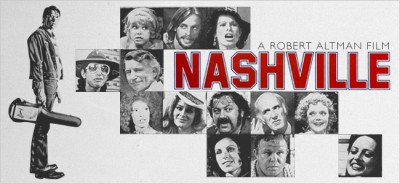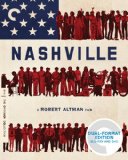| Reviews & Columns |
|
Reviews DVD TV on DVD Blu-ray 4K UHD International DVDs In Theaters Reviews by Studio Video Games Features Collector Series DVDs Easter Egg Database Interviews DVD Talk Radio Feature Articles Columns Anime Talk DVD Savant Horror DVDs The M.O.D. Squad Art House HD Talk Silent DVD
|
DVD Talk Forum |
|
|
| Resources |
|
DVD Price Search Customer Service #'s RCE Info Links |
|
Columns
|
|
|
Nashville (Criterion Collection)
Altman had been evolving toward this kind of storytelling beginning with M*A*S*H (1970) and, after crystalizing the form in Nashville, would return to it again in the underrated A Wedding (1978), the somewhat overrated The Player (1992), and a few others. But in 1975 Nashville was quite daring, the work of a supremely confident, in some ways self-destructive filmmaker to whom ordinary movie-making rules did not apply.
Nashville had previous been released by owner Paramount as an okay if no-frills DVD in 2000. Criterion's Blu-ray offers vastly improved picture and wonderfully immersive sound, the latter vitally important in fully appreciating the work's complex sound design. The new Blu-ray-plus-DVD combo also includes scads of extra features, including an original making-of documentary that includes some of the film's key participants.
Nashville's story, such as it is, is spread across five days, freely editing among the major characters, often with two or more on the screen at the same time, sometimes interacting, while at other times two characters or two or more groupings of characters are merely at the same location at the same time, acting out separate but intersecting storylines.
The most prominent characters include Haven Hamilton (Henry Gibson), a socially conservative, arrogant country music star; Linnea Reese (Lily Tomlin), a gospel singer and mother of two deaf children; Del Reese (Ned Beatty), her lawyer husband and Hamilton's legal representative, who works as the local political organizer for the Tea Party-like Hal Philip Walker Presidential campaign; Opal (Geraldine Chaplin), an insufferably garrulous and pretentious BBC Radio reporter on assignment in Nashville, or so she claims; talented but self-involved sex-addict Tom Frank (Keith Carradine), one-third of a moderately successful folk trio who's anxious to launch a solo career; John Triplette (Michael Murphy), the duplicitous campaign consultant who condescendingly tries to secure top Nashville stars to perform at a nationally-syndicated campaign rally; Barbara Jean (Ronee Blakley), the emotionally-fragile, beloved Loretta Lynn-like country star recovering from a burn accident; Barnett (Allen Garfield), Barbara Jean's overwhelmed manager-husband; Mr. Green (Keenan Wynn), whose never-seen ailing wife is on the same hospital ward as Barbara Jean; groupie Martha (Shelley Duvall), Green's niece, ostensibly there to visit her ailing aunt but so personally irresponsible that she instead spends all her time picking up men; Pfc. Glenn Kelly (Scott Glenn), who claims his mother saved Barbara Jean's life but who mostly seems obsessed with the country music star; Sueleen Gay (Gwen Welles), a waitress longing for country music fame, despite her vacuous talent; Bill and Mary (Allan F. Nicholls and Cristina Raines), the other two-thirds of Tom's folk act, whose ambition overrides constant personal rancor; Winifred (Barbara Harris), another would-be singer-songwriter, fleeing to Nashville from her working-class husband, Star (Bert Remsen); Kenny Frasier (David Hayward), a loner who rents a room from Mr. Green and carries around a violin case; Bud Hamilton (Dave Peel), the gentle, loyal son of the abrasive Hamilton; Connie White (Karen Black), a glamorous country star who is a last-minute substitute for Barbara Jean at the Grand Old Opry; Wade Cooley (Robert DoQui), a cook at the airport restaurant where Sueleen works as a waitress and who tries unsuccessfully to convince her that she has no talent; and the eccentric Tricycle Man (Jeff Goldblum), who rides around in a three-wheel motorcycle, occasionally interacting with the other characters, showing off his amateur magic tricks, but who has no dialogue.
Nashville began after Robert Altman was approached to direct an entirely different film set there. Although he ended up turning that project down, he sent Joan Tewkesbury to Nashville to scout locations and the diary she kept of her experiences became the basis for the script. As with other Altman projects, her screenplay functioned as a kind of blueprint, getting characters from Point A to Point B and holding the spaghetti-like narrative threads in place, but the actors were intensely involved in the creation of their characters, writing (or improvising) much of their own dialogue. Like Kurosawa did before him, Altman used multiple cameras to film the big crowd scenes; the actors had to remain in character because they had no way of knowing what footage of them might be used.
Further, for Nashville Altman insisted those playing aspiring or established music stars write their own music and perform it live. This resulted in a couple of bona fide hits, notably Keith Carradine's "I'm Easy" and "It Don't Worry Me," while all the other songs have an equally authentic air, even the ludicrous "I Never Get Enough" (performed though not written by Gwen Welles) and "200 Years," a hilarious would-be patriotic Bicentennial tribute to America performed and co-written by Henry Gibson. Sixty of the film's 160 minutes consist of musical performances.
So what is Nashville about? Basically Altman uses the country music scene as a microcosm of American shallowness, its obsession with celebrity and their symbiotic manipulation by politicians (impressively prophetic now, in retrospect). The established stars and clearly-ascending talent are generally narcissistic (such as Carradine's character), bombastic (Gibson's), proprietary (Black's), or emotionally unstable (Blakley's), while those aspiring to stardom are either delusional about their abilities and chances (Welles's) or shrewdly opportunistic (Barbara Harris). Few seem remotely happy and most seethe with envy and unfulfilled longing. No wonder the real-life denizens of Nashville positively hated Altman's vision of the place.
Reportedly Altman had enough material for two proposed films: "Nashville Red" and "Nashville Blue," though Altman later denied this, claiming most everything he shot ended up in the final film.
The film works best when the viewer goes into it cold and lets it wash over them. Filmed in 2.35:1 Panavision and originally released in four-track magnetic stereo sound (a rarity in 1975, a period in which nearly all movies were mono), the movie was all but impossible to appreciate on television and even subsequent superior home video formats like laserdisc. Altman's backing of "Lion's Gate 8-Track Sound" during production illustrates that he understood the film's soundtrack was as vital as his imaginatively busy use of widescreen.
In its final form, Nashville has some characters that remain underdeveloped or just don't work particularly well, such as Goldblum's Tricycle Man character. But the film also has too many memorable vignettes to count: Haven Hamilton's prickly recording session, where he mercilessly browbeats a hippie pianist; Barbara Jean's squirmily uncomfortable, rambling psychological meltdown while performing live for an impatient, unforgiving audience; Sueleen's conflicted ambitions when her "big break" devolves into a cheap striptease act; gentle Mr. Green's quiet suffering at the hands of his flakey niece; John Triplette's negotiations with various talent, buttering each of them up with compliments while at the same time insulting the musical form (and its admirers) in which they practice.
And then there is, of course, Nashville's justly celebrated (if artistically contested by some), messy and chaotic but shattering climax, a political rally that turns tragic, which Altman uses to sum up the state of an equally messy and chaotic American society on the eve of its 200th birthday.
Video & Audio
Nashville arrives on Blu-ray in a splendid 2K video transfer created from a 35mm interpositive. On big screen TVs the image comes alive better than any previous home video incarnation, but it's the superlative 5.1 surround remix (at 24-bit from the 35mm LCRS and dialogue-music-effects tracks) that most impresses. Experiencing the film on a good surround system is a must. The film is closed-captioned and region "A" encoded. Not being used to Criterion's Blu-ray-plus-DVD combos I accidentally stuck one of the two accompanying DVDs (region 1) into my Blu-ray player at first. The package design, menu screens, etc. are all tops.
Extra Features
Supplements include an archival audio commentary with the late director (who died in 2006); and a new documentary featuring Kathryn Reed Altman (Robert's widow), assistant director Alan Rudolph, Tewkesbury, Blakley, Carradine, Murphy, Nicholls, and Tomlin. Also included are three archival interviews with Altman, behind-the-scenes footage, Carradine's song demo footage, a trailer, and an insightful booklet essay by critic Molly Haskell.
Parting Thoughts
One of the great watershed movies, at last available in a form optimizing its picture and (especially) its sound, Nashville is a DVD Talk Collector Series Title.
Stuart Galbraith IV is the Kyoto-based film historian and publisher-editor of World Cinema Paradise. His credits include film history books, DVD and Blu-ray audio commentaries and special features.
|
| Popular Reviews |
| Sponsored Links |
|
|
| Sponsored Links |
|
|
| Release List | Reviews | Shop | Newsletter | Forum | DVD Giveaways | Blu-Ray | Advertise |
|
Copyright 2024 DVDTalk.com All Rights Reserved. Legal Info, Privacy Policy, Terms of Use,
Manage Preferences,
Your Privacy Choices | |||||||













